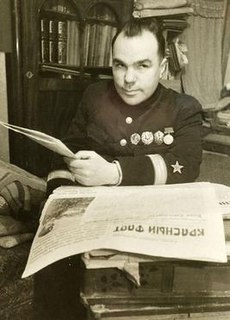
Sergei Sergeyevich Prokofiev was a Russian Soviet composer, pianist and conductor. As the creator of acknowledged masterpieces across numerous musical genres, he is regarded as one of the major composers of the 20th century. His works include such widely heard pieces as the March from The Love for Three Oranges, the suite Lieutenant Kijé, the ballet Romeo and Juliet—from which "Dance of the Knights" is taken—and Peter and the Wolf. Of the established forms and genres in which he worked, he created – excluding juvenilia – seven completed operas, seven symphonies, eight ballets, five piano concertos, two violin concertos, a cello concerto, a symphony-concerto for cello and orchestra, and nine completed piano sonatas.

The USSR State Prize was the Soviet Union's state honor. It was established on September 9, 1966. After the breakup of the Soviet Union, the prize was followed up by the State Prize of the Russian Federation.

Sergei Alexandrovich Yesenin was a Russian lyric poet. He is one of the most popular and well-known Russian poets of the 20th century.

May Night is a comic opera in three acts, four scenes, by Nikolai Rimsky-Korsakov from a libretto by the composer and is based on Nikolai Gogol's story "May Night, or the Drowned Maiden", from his collection Evenings on a Farm Near Dikanka.

Sergey Anatolyevich Kuryokhin was a Russian composer, pianist, music director, experimental artist, film actor and writer, based in St. Petersburg, Russia.
Sergei Mikhailovich Slonimsky is a Russian and Soviet composer, pianist and musicologist.
Vishnevsky or Vishnevskaya is the Russian surname of the Polish equivalent Wiśniewski, which may refer to:

Alexander Yakovlevich Tairov was one of the leading innovators of theatrical art, and one of the most enduring theatre directors in Russia, and through the Soviet era.
Natalya Nikolayevna Belokhvostikova is a retired Soviet and Russian actress. She was awarded the title People's Artist of Russia in 1984.
Mikhail Fabianovich Gnessin was a Russian Jewish composer and teacher. Gnessin's works The Maccabeans and The Youth of Abraham earned him the nickname the "Jewish Glinka".

Optimistic Tragedy is a 1963 Soviet film directed by Samson Samsonov. It is based on the eponymous play by Vsevolod Vishnevsky and was entered into the 1963 Cannes Film Festival.

The State Anthem of the Sakha Republic or National Anthem of Yakutia is the regional anthem of the Sakha Republic, a federal subject of Russia. The national anthem is one of the official symbols of the Sakha Republic, alongside with the flag and the coat of arms of the Sakha Republic. It was originally written in the Sakha language by Savva Tarasov and Mikhail Timofeyev. The anthem was translated into Russian by Vladimir Fedorov. The music was composed by Kirill Gerasimov. The anthem was officially adopted on 15 July 2004.

Alisa Georgyevna Koonen, also known as Alice Coonen, was a Russian and Soviet actress and the wife of the director Alexander Tairov.
Not Love Alone is the first opera of Rodion Shchedrin, written 1961, revised in 1971.

Elena Borisovna Frolova is a Russian singer-songwriter, composer, and poet. She is author and performer of songs based on poems by many Russian poets of twentieth century, including Marina Tsvetaeva, Sophia Parnok, Joseph Brodsky, Anna Barkova, Andrei Belyi, Varlam Shalamov, Maria Petrovykh, Veniamin Blazhenny, Bulat Okudzhava, and many others, as well as her own poetry. Frolova is one of few performers who uses Russian folk instrument gusli and ancient harp, along with classical six-string guitar for the accompaniment. During 25 years of work she created more than 630 songs and published more than 40 music albums.

Vsevolod Dmitrievich Safonov was a Soviet actor of theatre and cinema. He was awarded the title People's Artist of the USSR Prize (1974).
Alexander Grigoryevitch Fridlender was a Soviet composer, pianist and conductor, Professor at the Urals Mussorgsky State Conservatoire.












